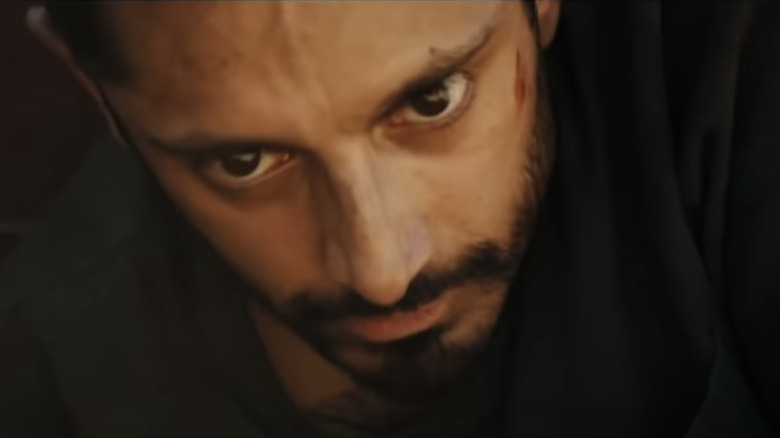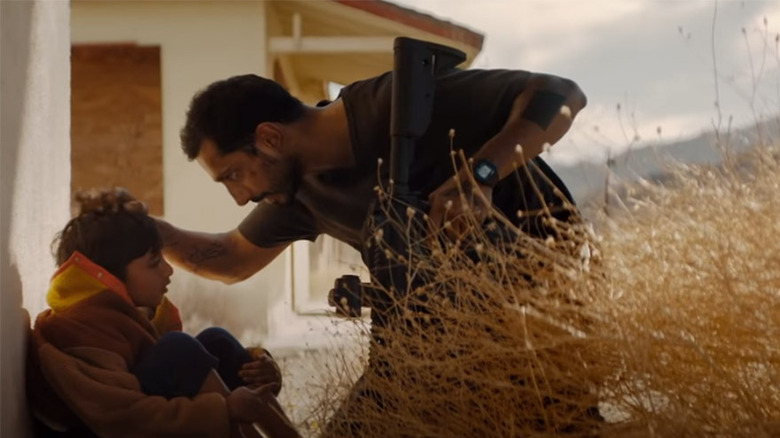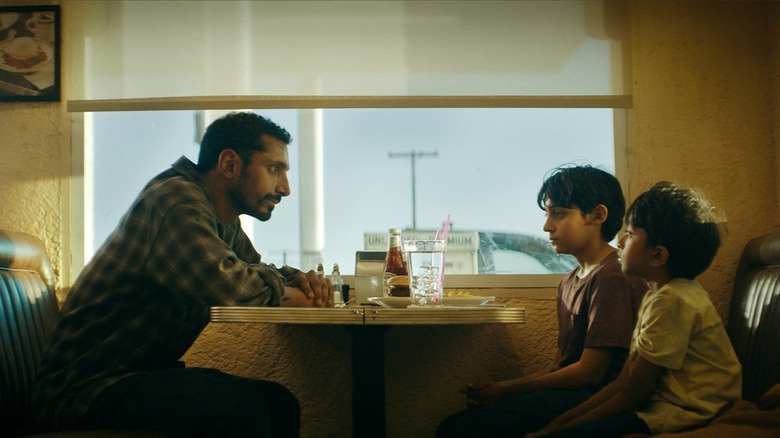TIFF Movie Review: Encounter
For a psychological thriller to truly work, it needs to lean into the ambiguous, and create a palpable sense of paranoia that envelops the audience as much as the characters onscreen. Director Michael Pearce's debut film "Beast" is one of the best recent examples of the genre, featuring a breakout performance from Jessie Buckley as an alienated young woman who becomes increasingly detached as she discovers the man she's dating has been accused of a string of murders. It's a film that never lays its cards out too clearly, not revealing its hand until a final scene that recontextualizes the entire drama. It's deeply gripping, and all the more impressive as a first feature — eventually bagging Pearce the BAFTA for Best British Debut and pegging him as a filmmaker to watch.
As is the case with many British filmmakers after their first brush with success, Pearce has gone across the pond with his sophomore feature "Encounter," a science fiction-inflected tale that shares more than a little DNA with his debut. This is another psychological thriller as seen through the eyes of an unreliable narrator, a film that's at its best when keeping its lips sealed about which version of events can be trusted. It never stops being thrilling, but if it is considerably less effective than Pearce's debut, then it's because the film stops leaning into the ambiguity of events halfway through, conclusively telling us what we should believe. It's a solidly entertaining movie, but one that frustratingly hints at something better, more liable to get under the skin and stay there, instead of one that keeps revealing its secrets through exposition.
Best at its most ambiguous
The always fantastic Riz Ahmed stars as Malik, a former Marine with proof that the world is in the midst of an alien invasion from intergalactic parasites infecting wasps and other insects that in turn infect the human body via biting them. Once under their control, the host body becomes a prison, unable to act freely. Malik predicts about half the US population is already infected, with the only way to protect yourself being to douse yourself in bug spray. After being estranged for two years because of active duty, he goes to visit his two young sons Jay (Lucian-River Chauhan) and Bobby (Aditya Geddada), but immediately, something isn't right. Flashing a light in the eyes of his ex-wife — the only way of checking for infection — he becomes convinced she too is now an alien, so takes the kids and embarks on a road trip to a safe area where they can be protected from a quiet invasion.
It's this opening act where the film is at its strongest, blending the paranoid horror of "Invasion of the Body Snatchers" with frequently stunning visuals that effectively recall "Under the Skin" in how they realize an alien life force coming to Earth on a shoestring budget. Pearce and co-screenwriter Joe Barton don't immediately reveal the narrative's biggest secret, playing coy as to whether Malik has found out the truth about a covert alien invasion, or whether he's just suffering from intense delusions. This is largely because most of the drama is seen from a childlike perspective, with two sons taking everything their dad says at face value largely because they have both been kept in the dark about his whereabouts for the last two years. Unfortunately, after the first act, Pearce and Barton disperse with the subtlety and divulge their big reveal, conclusively answering the question as to just how much we can trust Malik's perspective — a sequence that would have been considerably more effective had they spent more time letting the audience linger on both possibilities.
As the film won't be released on Amazon Prime Video until December (it's just had its world premiere at the Toronto International Film Festival, sharply dividing critics), this is not a plot point that I'll give away here, saying only that the second half quickly transforms into a complex family drama, reorienting itself around the conclusive truth. The genre overtones are still there, but it's not as reliant on its fantastical visuals, grounding itself to focus more on the human cost of what Malik has witnessed. A supporting performance from Octavia Spencer as an acquaintance of Malik further flattens out any of its ambiguities, the great actor doing her best with a role that mostly exists only to deliver exposition, leaving nobody in the audience remotely confused as to where the lead character's headspace truly lies.
Held together by Riz Ahmed
It's a disappointing development considering so much of what intrigues about "Encounter" is its early subtlety, lingering on certain visuals for long enough to cast enough doubt about the trustworthiness of the narrative. Many critics have described the film as uneven, and I'd be liable to agree, even if I don't think the second half is remotely bad — it's still entertaining, just inevitably less intense because of how quickly it reveals just what type of movie it is we're watching. It's a film that would perhaps be better to assess on a second watch, fully aware that it's not concerned with creating an air of mystery, and wants to be a supernaturally-tinged drama about a destructive father in the same vein as "Frailty," the 2001 movie directed by Bill Paxton. But even considering this, it's hard to look past the way it shows its hand halfway through in the form of an awkward twist most will have seen coming, and hoped the film would subvert in some way.
The film is held together by a typically commanding lead performance from Ahmed, showcasing a man who hides his paranoia through sheer force of charisma. As the film teases that this could all be in his head, there is an eery sense of timeliness — after all, we are living in a time of mass conspiracies about vaccines that many are risking the lives of their families by buying into. But "Encounter" doesn't fully work as allegory, any larger ideas fading into the background after its opening stretch.
Due to the very nature of its ambiguities, the possibility that this could transform into a reductive mental illness drama is apparent from its early stages. It's to the credit of Ahmed and Pearce that the lead performance doesn't play into any unwelcome stereotypes, or utilize any unsavory tics as a shorthand for any possible condition. In fact, even as the drama around him tells you exactly what he's doing, Ahmed still leans into the ambiguous — he can make things feel less than certain even as the film can't stop reassuring you about what is truth and what is fiction.
"Encounter" is a mixed bag, two equally satisfying films thrown together into a slightly disappointing whole. Riz Ahmed manages to hold the whole thing together, but I suspect many will still be left bemused as to why the film abruptly drops its effective brand of paranoid sci-fi halfway through.


